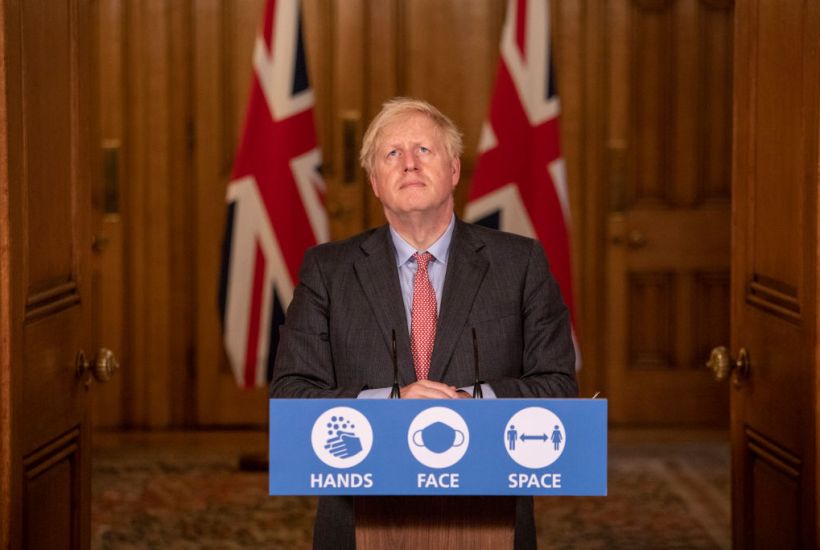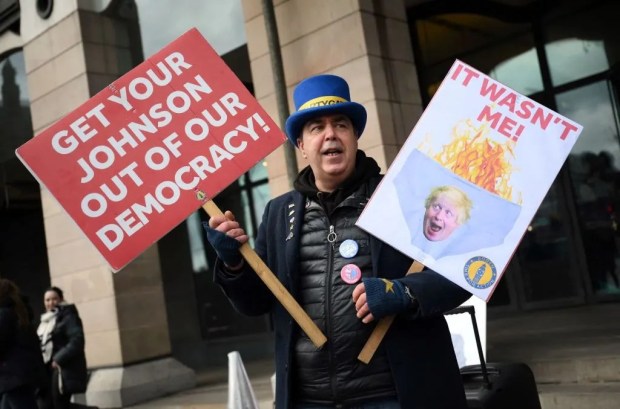Boris Johnson probably thought he emerged from Prime Minister’s Questions this week having maximised his freedom of manoeuvre in the battle against coronavirus. Indeed, at one point he made it explicitly clear that he was not promising that there would be no second national lockdown, declaring: ‘I rule out nothing.’
While that may be the formal position, the politics of the issue now make it much less likely that the Prime Minister will go down this track. That should be a cause for optimism among all of us who believe further nationwide lockdowns will do immense economic harm while securing little if any lasting public health advantages.
The Prime Minister is now less likely to go for another nationwide lockdown, or ‘circuit-breaker’ as it is has been jazzily rebadged, for several reasons. Partly it is because doing so would make him look slow and stupid. Having already called for such a measure, Keir Starmer would be home and hosed and preening like a thoroughbred in the winner’s enclosure by the time Johnson came limping in to be unsaddled and possibly redirected to the nearest glue factory.
But on a happier note, it is also because the Prime Minister found himself, perhaps almost as much to his own surprise as ours, making a cogent intellectual case against this crudest and most indiscriminate of measures.
He expected to avoid another lockdown because building the biggest testing operation in Europe allowed the Government to know ‘where the virus is surging’, he said, contrasting Liverpool’s 628 cases per 100,000 of population with Cornwall’s 33.
In this he found an unlikely ally in former Lib Dem leader Vince Cable, one of very few economically literate left-of-centre figures of recent vintage, who tweeted:
‘Sorry to pour cold water on progressive consensus but how does lockdown in Devon, Cornwall, Dorset etc help fight upsurge in cities at other end of country?’
Johnson in the Commons, was getting into his stride, adding that we must ‘seize the moment to avoid the misery of another national lockdown’ by taking a regional approach to bringing down the R value. This would, he added, enable Britain ‘to keep our businesses going…and suppress the virus where it is surging’.
With more than 40 Tory MPs having voted against the tougher restrictions already brought forward by ministers, this language was very helpful for party unity. Not only did it show the PM acknowledging that the economic impact of measures was an important factor to be weighed in the balance, but also that he understood it is now not beyond the bounds of possibility that a cleverly-worded opposition motion on Covid policy could lead to a Commons defeat for the Government.
More importantly still, Johnson was pinning himself to the logic of using the extra data we now have about our viral foe to inform a tailored approach to tackling it.
Take the PM’s contrast between Merseyside and Cornwall. Roughly speaking, you are 20 times as likely to catch this disease in the former than in the latter right now. So Cornwall is being subjected to fewer jobs-destroying repressive measures. The Starmerites would, by contrast, close down more businesses and wreck more livelihoods in Truro because of a high incidence of Covid in Tranmere. As Dr Cable noted, that doesn’t make any sense.
But location is not the only risk factor we know a lot more about these days. The data also tells us, for instance, that in England you are about 400 times more likely to be killed if you pick up a Covid infection if you are over 75 than under 45.
This astonishing degree of difference is echoed in the Government’s own latest statistics, unveiled by Johnson and Chris Whitty at their Downing Street press conference on Monday, on the contrasting age profiles of those currently being infected by Covid and hospitalised by it.
In short, the vast majority of those getting the disease are under 65 and yet the vast majority of those being hospitalised by it are over 65 – and mainly over 75. Nearly all the patients requiring hospital care are being drawn from a very small pool of older retired people who have been getting infected, while nearly all working-age people have been getting better under their own steam.
Yet while the Prime Minister is now a keen advocate of using a geographical scalpel to fight Covid, he is currently still deploying a generational sledge-hammer. The Government even abandoned its shielding regime altogether in the summer and has not reinstated it.
So we have the spectacle of university students being locked down in tiny rooms in halls of residence amid many thousands of positive tests on campuses this autumn despite there (at least to my knowledge) being not a single recorded case anywhere in the country of any of them dying and hardly any of them even needing to go to hospital.
At the same time, elderly people who are at far greater risk of serious illness and death have been left to get ‘back to normal’ give or take a bit of extra-handwashing and more spaced out shopping queues. This is positively perverse. And the PM’s own case for tailoring the Government’s response to the level of risk, set out at Wednesday’s seminal PMQs, means it will surely have to change.
It is not good enough for Messrs Whitty, Hancock and Vallance simply to aver that once the disease is circulating in younger age groups it is bound to spread extensively to the elderly. Not when there is zero effort going into constructing a smart shielding regime.
So well said, Boris. Why sacrifice jobs in Cornwall because Liverpool is a hot spot? But why, also, cause further economic carnage by applying the same restrictions and instructions to the working age population as to the frail elderly?
Labour’s Mr Forensic may have just adopted the least forensic anti-Covid policy imaginable. But the Prime Minister has found himself starting to make the case for a smarter response. He will find it very difficult to turn back from that.
Got something to add? Join the discussion and comment below.
Get 10 issues for just $10
Subscribe to The Spectator Australia today for the next 10 magazine issues, plus full online access, for just $10.




















Comments
Don't miss out
Join the conversation with other Spectator Australia readers. Subscribe to leave a comment.
SUBSCRIBEAlready a subscriber? Log in